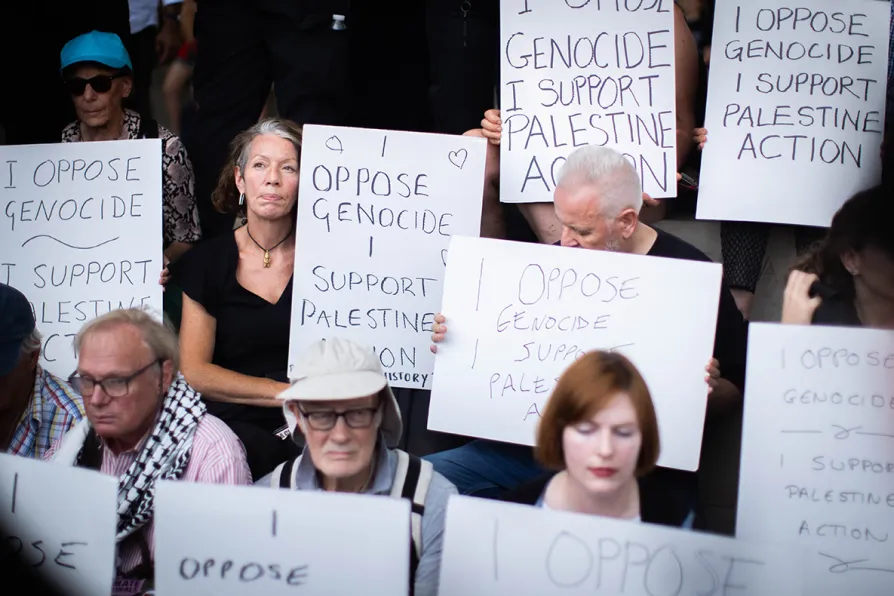
 People take part in a protest in Parliament Square, London, to call for de-proscription of Palestine Action after a ban against the organisation, July 12, 2025
People take part in a protest in Parliament Square, London, to call for de-proscription of Palestine Action after a ban against the organisation, July 12, 2025
PALESTINE ACTION’S co-founder won permission today to bring a High Court challenge against the group’s designation as a terror organisation.
Huda Ammori is challenging Home Secretary Yvette Cooper’s decision to proscribe the group under anti-terror laws, following an action in which two Voyager planes were damaged at RAF Brize Norton on June 20.
The ban makes membership or support for the group a criminal offence punishable by up to 14 years in prison and has already seen hundreds of peaceful protesters arrested.
Ms Ammori’s legal team described the decision as an “unlawful interference” with freedom of expression.
In his ruling today, Mr Justice Chamberlain said it was “reasonably arguable” that the proscription is a disproportionate interference with rights to freedom of expression and assembly.
He said that Ms Cooper’s failure to consult Palestine Action before issuing the order “could also go to a full hearing” and found it “reasonably arguable that there was no compelling reason” not to consult those affected.
Several other arguments were dismissed, including claims that the Home Secretary failed to assess the group’s activities adequately, breached equality duties or relied on irrelevant considerations.
But the judge noted that police actions against Palestine supporters “are liable to have a chilling effect” and could be an indirect consequence of the ban.
Following the ruling, Ms Ammori said the decision “demonstrates the significance of this case for freedoms of speech, expression and assembly” and condemned the ban as an effort to “criminalise thousands of supporters.”
“Our fundamental freedoms as citizens of this country are at stake,” she said, “… as Justice Chamberlain said, there has been a wider ‘chilling effect on those wishing to express legitimate political views’… making people fearful to speak out against Israel as it commits genocide and starves the Palestinian people to death.”
Ms Ammori said the Home Office’s own evidence states that Palestine Action “has not advocated violence” and most of its actions “would not be classified as terrorism” under UN definitions.
“We will not stop defending fundamental rights to free speech and expression in our country and supporting Palestinian people against a genocide being livestreamed before our eyes,” she said.
Her application to temporarily suspend the ban was rejected.
The Home Office is defending the legal action. Intervening for the government, Sir James Eadie KC argued the group’s property damage brings it within the scope of terrorism legislation.
A Defend Our Juries spokesperson said that Ms Cooper “has no-one to blame for this crisis but herself.”
On the ruling’s noting of the Home Secretary’s failure to consult appropriately, they said: “While she consulted with the Israeli government and Elbit Systems on the merits of the order… she failed to consult with those adversely affected, such as Palestine Action and civil liberties organisations.
“If you only consult with those who stand to benefit from your proposal, those who are committing and supporting genocide, but not those who will be adversely affected, not those who are acting to prevent genocide, your bias is already exposed.
“We are confident the High Court will soon strike down this absurd and repugnant order.”
Cage International’s Anas Mustapha said: “It is well known that options available for ‘checks and balances’ against the excesses of the executive in the UK in relation to counter-terrorism measures, are largely ineffective.
“For years, the executive has been able to pass and enforce draconian anti-terror laws, including that of proscription, with little recourse to justice.
“While we are cautiously optimistic that a judicial review has been granted, our call remains an abolishment of the very counter-terror legislation that has given the executive near unfettered power to ban organisations at a whim, vilify people as terrorists and curtail fundamental freedoms.”
Greenpeace UK co-executive director Areeba Hamid said: “Protests, even when they are disruptive or inconvenient, are absolutely not the same thing as terrorism.
“There is a long tradition of protest in Britain that has helped win many of the freedoms we enjoy today such as votes for women and a ban on commercial whaling.
“Treating direct action as terrorism is a dangerous and worrying escalation of the ongoing crackdown on protest and freedom of speech in the UK.”
Green Party peer Baroness Jones of Moulsecoomb said that the government has a chance to “lift this ban… before being further ridiculed in the courts and internationally.”
Baroness Jones, who moved a motion to “regret” the proscription order in the Lords earlier this month, said: “The government needs to take this opportunity to rethink Palestine Action’s proscription.
“Spraying paint on refuelling planes that campaigners believe are used to help the ethnic cleansing in Gaza is not terrorism.
“It’s criminal damage, for which we already have laws.”
Mr Justice Chamberlain said yesterday that a High Court challenge could take place in the autumn of this year, whereas an appeal to the specialist tribunal would take much longer.
The judge also said that people protesting in support of Palestine and Gaza, but not expressing support for Palestine Action, had “attracted various kinds of police attention, from questioning to arrest.”
He said that it was “important not to draw too much from the fact that police and others appear to have misunderstood the law on some occasions.”
But he added: “Nonetheless, reports of the kind of police conduct referred to… are liable to have a chilling effect on those wishing to express legitimate political views.
“This effect can properly be regarded as an indirect consequence of the proscription order.”










